Local Government, Housing and Planning Committee
Annual Report of the Local Government, Housing and Planning Committee for 2021-22
Introduction
This report covers the work of the Local Government, Housing and Planning Committee during the parliamentary year from 13 May 2021 to 12 May 2022.
This is the Committee's first annual report since its establishment in June 2021.
Membership changes
There were three membership changes in the reporting year:
Elena Whitham left the Committee on 24 January 2022 and was replaced by Graeme Dey;
Graeme Dey and Meghan Gallacher left the Committee on 31 March 2022 and were replaced by Marie McNair and Annie Wells.
Meetings
The Committee held 30 meetings over this period, all of which took place partly in private. No meetings were held entirely in private. Items taken in private generally involved consideration of evidence heard earlier in the meeting, consideration of draft reports and approaches to inquiries and other work programme issues.
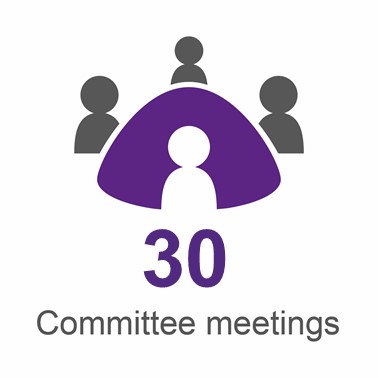
Equalities and engagement
The Committee is keen to encourage diversity in the witnesses it invites, and asks organisations to consider this when identifying representatives to speak to the Committee. It has also made it a priority to ensure that under-represented groups are able to contribute to the Committee's work and is particularly keen to hear from those with lived experience, for example, the Committee worked closely with Scottish Community Alliance to identify community representatives to contribute to the Committee’s scrutiny of the Local Governance Review.
The Committee has also undertaken work on barriers to elected office as set out below. This piece of work involved consideration of the diversity of serving councillors and how representative they were of Scottish society as a whole in terms of age, ethnicity, sex and other protected characteristics. The Committee concluded that more work needed to be done on this issue and agreed to return to it after the recent 2022 local government elections.
The Committee has also undertaken a number of pieces of external engagement work as follows—
Retrofitting
Members of the Committee visited the Niddrie Road EnerPHit Retrofit project to see retrofitting work in practice. The tenement retrofit comprises eight single bed flats in one traditional tenement close on Niddrie Road in Strathbungo East, Glasgow in the inner south side of the city. To learn wider lessons for tenement retrofit, the project is being thoroughly evaluated by a research partnership resourced by the Scottish Funding Council. The visit informed a subsequent evidence session with stakeholders on retrofitting and a chamber debate.
Committee visits the EnerPHit Retrofit project 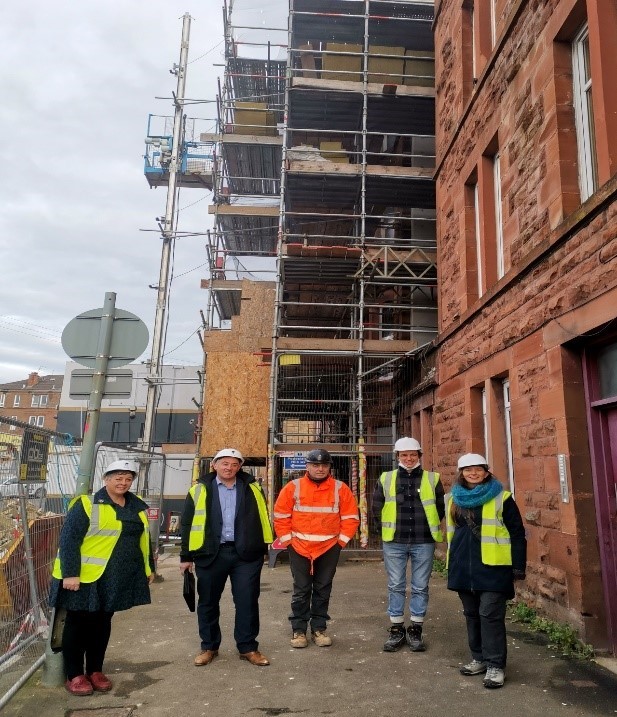
National Planning Framework 4 (NPF4) Engagement
In February 2022 the Committee met with MSYPs from Scottish Youth Parliament to hear their views on climate change, rural population and 20-minute neighbourhoods. This was a particularly helpful discussion as it allowed Members to hear about the priorities of younger people and ways in which they could help to influence planning decisions that impacted on services and communities. The Committee also held sessions on the same day with stakeholder groups representing communities across Scotland, which again proved incredibly beneficial in understanding how planning can impact on communities.
On 21 February 2022, Committee members visited Govan to discuss how NPF4 might affect community regeneration projects in the area, most notably the transformation of Old Govan Church into a museum and the regeneration of the Govan Graving Docks. Members engaged with community activists, council planners and other relevant organisations to learn about the challenges and opportunities that had impacted on the project and to hear about ways in which such projects could be facilitated.
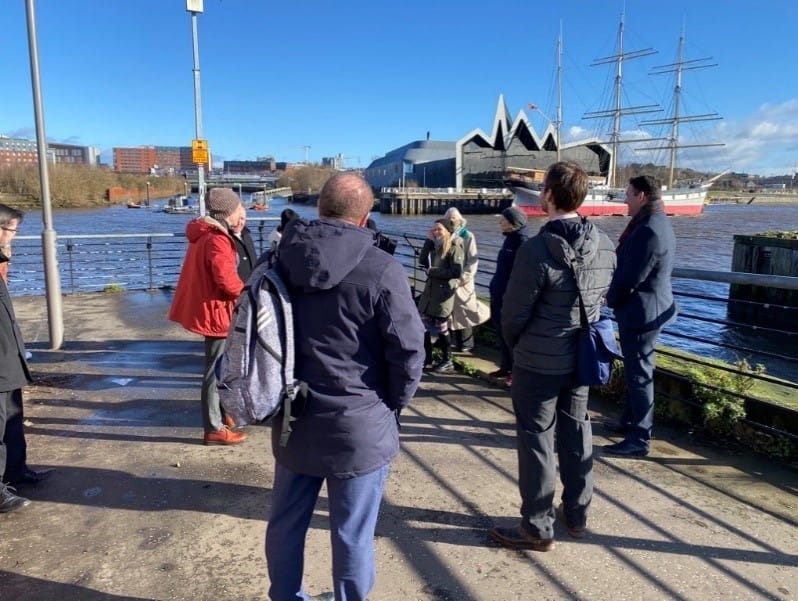
Legislation
During the reporting year the Committee considered both primary and secondary legislation.
Bills
The Committee considered two Bills during the reporting year—
Coronavirus (Recovery and Reform) (Scotland) Bill; and
Non-Domestic Rates (Coronavirus) Scotland) Bill.
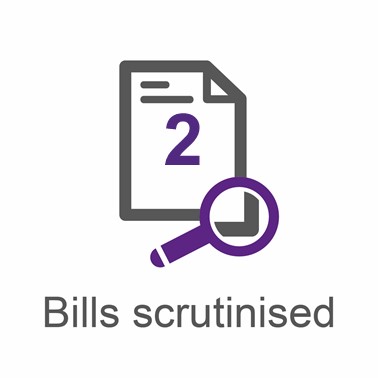
Coronavirus (Recovery and Reform) (Scotland) Bill
The Coronavirus (Recovery and Reform) (Scotland) Bill was introduced in the Scottish Parliament by the Scottish Government on 25 January 2022. The COVID-19 Recovery Committee was designated as the lead committee for consideration of the Bill.
The Local Government, Housing and Planning Committee was designated as a secondary committee and its focus was on the tenancies provisions in Part 4 of the Bill. The Education, Children and Young People Committee and the Criminal Justice Committee were also designated as secondary committees for relevant parts of the Bill.
The lead and secondary committees published a joint call for views on 3 February 2022 and invited respondents to complete either a detailed response, or a short survey. The committees received 89 written submissions and 3,926 respondents completed the survey. The lead and secondary committees also took oral evidence from stakeholders and Scottish Ministers at Stage 1.
The Scottish Government was given time-limited emergency powers to respond to COVID-19 in the Coronavirus Act 2020, the Coronavirus (Scotland) Act 2020, and the Coronavirus (Scotland) (No.2) Act 2020. Some of these provisions were extended by the Coronavirus (Extension and Expiry) (Scotland) Act 2021. The purpose of the Bill is to make permanent some of the time-limited powers that were contained in the previous legislation and to extend others for a further period. The Bill also introduces new measures that were not contained in the emergency legislation, which the Scottish Government considers are complimentary to the overall purpose of the Bill.
The Committee took evidence on Part 4 of the Bill from a panel of stakeholders, followed by the Minister for Zero Carbon Buildings, Active Travel and Tenants’ Rights on 8 March 2022. It then published its Stage 1 Report on Part 4 of the Bill on 20 April 2022.
Non-Domestic Rates (Coronavirus) (Scotland) Bill
The Non-Domestic Rates (Coronavirus) (Scotland) Bill was introduced in the Scottish Parliament by the Scottish Government on 14 December 2021 and the Local Government, Housing and Planning Committee was designated as the lead committee for consideration of the Bill.
The Bill was introduced in response to a spike in non-domestic property appeals since the start of the coronavirus pandemic. It expands on the policy put in place by The Valuation and Rating (Coronavirus) (Scotland) Order 2021 (S.S.I. 2021/445). This Order came into force on 1 December 2021 and specified that in calculating the rateable value of any properties on the 2017 valuation roll after the instrument comes into force, no account can be taken of any matter arising on or after 1 April 2021 that is directly or indirectly attributable to coronavirus.
However, the Order could not be applied retrospectively. The primary purpose of the Bill therefore, was to extend this rule to cover both net annual value and rateable value and to cover the period back to 2 April 2020, the date on which the Scottish Government amended the definition of “material change of circumstances” (MCC) to exclude changes in economic circumstances.
The Committee issued a call for written views on the Bill in early January in response to which four submissions were received.
Given the level of scrutiny given to the Order, the Committee previously agreed that an extensive programme of evidence taking on the Bill was unlikely to be necessary. The Committee took oral evidence on the Bill from the Minister for Public Finance, Planning and Community Wealth on 15 March 2022. The Committee then published its Stage 1 Report on 20 April 2022. Stage 2 is expected to take place early in the 2022-23 reporting year.
Subordinate legislation
The Committee considered 27 Scottish Statutory Instruments during the reporting year, of which twelve were affirmative instruments whilst fifteen were negative instruments. Particularly significant instruments included—
Six sets of affirmative Regulations proposing changes to electoral arrangements in six council areas following reviews undertaken by Boundaries Scotland.
The Committee took evidence from affected councils on 14 September, Boundaries Scotland on 21 September, and the Deputy First Minister on 28 September. It then published its report on the Regulations on 30 September 2021.
Two sets of Short-Term Lets Regulations intended to—
make sure that short-term lets are safe;
help with issues faced by neighbours from short-terms lets; and
help councils know and understand what is happening in their areas in respect of the provision of short-term lets.
The Committee issued a survey inviting views on the licensing of short-term lets and took evidence from stakeholders on 7 December and 14 December. It then took evidence from the Cabinet Secretary for Social Justice, Housing and Local Government on 21 December before publishing its report later that day.
The Building (Scotland) Amendment Regulations 2022 which banned the use of combustible cladding in buildings over 11m in height following the tragic fire at Grenfell Tower, in addition to introducing requirements relating to heat efficiency in new buildings.
The Committee took evidence on the Regulations from a panel of stakeholders on 10 May and was expected to take evidence from the Minister for Zero-Carbon Homes, Active Travel and Tenants’ Rights early in the 2022-23 reporting year.
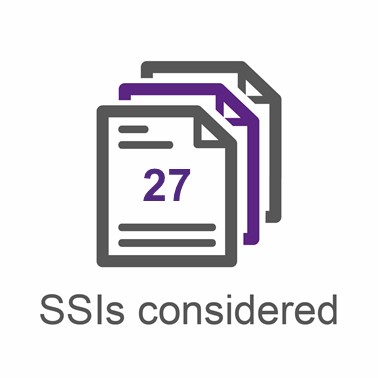
Inquiries and reports
The Committee undertook a number of inquiries over the Parliamentary year, some of which have already been discussed under the “subordinate legislation” heading above.
NPF4
Perhaps the most significant non-legislative inquiry work undertaken by the Committee in the reporting year was on the National Planning Framework (NPF4).
The Scottish Government published The Draft Fourth National Planning Framework (Draft NPF4), which details its long-term plan for what Scotland could be in 2045, on 10 November 2021.
Parliament had 120 days to report on the framework and the Local Government, Housing and Planning Committee led on this work. Given the impact of NPF4 in several different policy areas including planning, climate change, rural affairs, the economy, health and equalities, the Committee wrote to the following committees proposing collaborative scrutiny of NPF4—
Net Zero, Energy and Transport Committee
Rural Affairs, Islands and Natural Environment Committee
Economy and Fair Work Committee
Health, Social Care and Sport Committee
The Committee's collaborative approach aimed to maximise the effectiveness of scrutiny in the time available. There was a single Parliamentary call for views with individual subject committees then taking the lead on scrutinising the elements of NPF4 within their remits. Each Committee then wrote to relevant Cabinet Secretaries and to our committee with their findings.
The call for views was published in November 2021 and over 100 responses were received.
The Committee held five separate evidence sessions on NPF4 on 18 January, 25 January, 1 February, 8 February and 22 February when it heard from the Minister for Public Finance, Planning and Community Wealth.
The Committee then published its report on NPF4 on 31 March 2022. It is expected that the Scottish Government will publish a revised NPF4 in the next reporting year, following consultation on the draft and the Committee expects to consider this revised draft in due course.
Regulations on proposals made by Boundaries Scotland
Boundaries Scotland published the results of its review and recommendations on electoral arrangements in Orkney, Shetland, Highland, Western Isles, Argyll and Bute and North Ayrshire councils and the Committee issued an online questionnaire inviting views from residents of the affected council areas.
Over 150 responses were received and the Committee took evidence from affected councils on 14 September, Boundaries Scotland on 21 September, and the Deputy First Minister on 28 September. It then published its report on the Regulations on 30 September 2021.
Short-term lets regulations
The Committee considered two sets of Short-Term Lets Regulations intended to—
make sure that short-term lets are safe;
help with issues faced by neighbours from short-terms lets; and
help councils know and understand what is happening in their areas in respect of the provision of short-term lets.
The Committee issued a survey inviting views on the licensing of short-term lets and took evidence from stakeholders on 7 December and 14 December. It then took evidence from the Cabinet Secretary for Social Justice, Housing and Local Government on 21 December before publishing its report on the Regulations later that day.
Understanding barriers to participation in local politics
In advance of the local government elections this May the Committee issued a call for views and held an evidence session looking at the barriers, which are preventing younger people, women, disabled people and people of colour becoming councillors or remaining as councillors.
At the Committee’s evidence session on 23 November, the Committee heard from stakeholder groups, current councillors and political parties. The Committee intends to return to this issue.
Pre-budget scrutiny
In advance of the local government elections this May the Committee issued a call for views and held an evidence session looking at the barriers, which are preventing younger people, women, disabled people and people of colour becoming councillors or remaining as councillors.
At the Committee’s evidence session on 23 November, the Committee heard from stakeholder groups, current councillors and political parties. The Committee intends to return to this issue.
Budget scrutiny
Following publication of the Scottish Government Budget 2022-23 on 9 December 2021, the Committee took evidence from representatives of UNISON, COSLA and SOLACE on 11 January 2022. It then heard from the Cabinet Secretary for Finance and the Economy and the Cabinet Secretary for Social Justice, Housing and Local Government later in the same meeting.
The Committee continued to pursue issues around the role of local authorities in leading recovery from the pandemic. Following that session the Cabinet Secretary for Finance and the Economy wrote to the Committee on 24 January responding to issues raised in the meeting.
Committee reports
The Committee published 10 reports during the reporting year all of which can be accessed on the Committee’s website.
Public Petitions
The Committee did not consider any public petitions during the reporting year but is expected to do so in 2022-23.
Evidence from public bodies
During the reporting year the Committee took evidence from the Scottish Housing Regulator and the Scottish Public services Ombudsman on their respective annual reports. The focus of the session included the officeholders’ performance over the past year, whether they considered they had adequate powers to fulfil their roles, and key challenges resulting from the COVID-19 pandemic.
The Committee took evidence from the Scottish Housing Regulator on 22 March 2022 and from the Scottish Public Services Ombudsman on 29 March 2022.